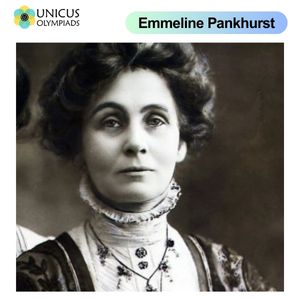

Throughout history, social reformers have played a crucial role in challenging the status quo, fighting for justice, equality, and human rights. These individuals have worked tirelessly to address social injustices, often at great personal cost, and their efforts have had lasting impacts on society. Two such reformers are Emmeline Pankhurst and Malala Yousafzai, who have become symbols of resilience and activism in the fight for women’s rights and education. While Pankhurst’s work in the early 20th century helped secure women’s suffrage in the UK, Malala’s advocacy for girls’ education in the 21st century has made her an international voice for female empowerment. This article delves into the lives of these two remarkable reformers, their contributions to social change, and the enduring legacies of their work.
Emmeline Pankhurst (1858-1928) was a British political activist who led the suffragette movement, which campaigned for women's right to vote. Her leadership was instrumental in securing voting rights for women in the UK, which was a significant milestone in the global struggle for gender equality. Pankhurst’s radical methods of activism, including hunger strikes and civil disobedience, made her a controversial figure but also a symbol of determination and resistance in the fight for women’s rights.

Pankhurst founded the Women’s Social and Political Union (WSPU) in 1903, which became the leading organization in the suffragette movement. The WSPU advocated for women’s right to vote using more aggressive tactics than previous suffrage groups. The suffragettes’ commitment to direct action, including protests, demonstrations, and even acts of civil disobedience, attracted both widespread support and intense opposition.
Pankhurst’s approach to activism was often considered radical for its time, as she believed that the only way to achieve political change was through direct and sometimes confrontational action. Her leadership galvanized thousands of women across the UK and inspired similar movements for women's rights around the world.
While Pankhurst’s activism helped bring about significant social change, her methods were often controversial. Her radical tactics alienated some members of the suffrage movement, and she faced fierce opposition from those who believed that women should not be involved in politics. Despite these challenges, Pankhurst’s unwavering dedication to her cause and her willingness to endure personal hardship made her one of the most important figures in the history of women's rights.
Malala Yousafzai, born in 1997 in Pakistan, is one of the most prominent global advocates for girls’ education and women’s rights. Malala’s journey from a young schoolgirl in Pakistan to a global icon for education is a remarkable story of courage and resilience in the face of adversity. Malala became a symbol of the fight for girls’ education after she survived an assassination attempt by the Taliban in 2012 for advocating girls’ right to attend school.

Malala’s activism began at a young age when she wrote a blog for the BBC Urdu, under a pseudonym, documenting her life under the Taliban’s rule in Pakistan and her desire to continue her education. Her writings brought international attention to the challenges faced by girls seeking education in conflict zones and under oppressive regimes.
After surviving the attack, Malala’s advocacy for girls' education gained global attention. She co-authored the memoir "I Am Malala," which became an international bestseller and further amplified her message. In 2013, Malala co-founded the Malala Fund, a nonprofit organization dedicated to empowering girls through education and advocating for educational equality worldwide.
Malala’s work has had a profound impact on global efforts to improve girls' access to education. She has received numerous accolades and awards for her advocacy, including the Nobel Peace Prize in 2014, becoming the youngest-ever recipient at the age of 17.
Despite her remarkable achievements, Malala has faced criticism, particularly from those who view her as a symbol of Western values and argue that her advocacy ignores the cultural and political context of the countries in which she works. Critics have also targeted her for being a global figurehead for education while not addressing broader societal issues in the countries where girls face significant barriers to education.
While Emmeline Pankhurst and Malala Yousafzai lived in vastly different times and contexts, both leaders share a common goal of advancing women's rights, particularly the right to education. Pankhurst fought for the right of women to vote, while Malala advocates for the right of girls to receive an education. Both women used their personal experiences and platforms to challenge societal norms and fight for the empowerment of women.
Both Pankhurst and Malala demonstrated remarkable courage in the face of adversity. Pankhurst’s willingness to be arrested and imprisoned for her beliefs and Malala’s decision to continue advocating for education after surviving an assassination attempt both exemplify the power of resilience in the face of extreme challenges. Their stories have inspired millions of people around the world to take action for gender equality and women’s empowerment.
The legacies of Pankhurst and Malala continue to resonate today. Pankhurst’s fight for women’s suffrage laid the foundation for gender equality in many parts of the world, while Malala’s efforts have sparked a global movement for girls’ education, with lasting impacts on policies, programs, and funding for education worldwide.